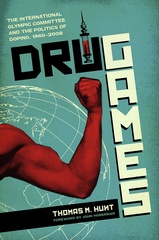Across the modern political spectrum, left-wing and right-wing political theorists have invested sport with ideological significance. That significance, however, varies distinctively and characteristically with the ideology—a phenomenon John Hoberman terms "ideological differentiation." Taking this phenomenon as its point of departure, this provocative work interprets the major sport ideologies of the twentieth century as distinct expressions of political doctrine.
Hoberman argues that a political ideology's interpretation of sport is shaped in part by the value it assigns to work and play as modes of experience; the political anthropologies of right and left can be distinguished by examining their resistance to—or affinity for—sportive imagery of their leaders and of the state itself; there exists a fascist temperament that shows an affinity to athleticism and the sphere of the body that is not shared by the left.
Tracing modern sport ideology back to its premodern antecedents, Hoberman examines the interpretations of sport that have been promulgated by European political intellectuals, such as cultural conservatives and contemporary neo-Marxists, and by the official ideologists of Nazi Germany, the Soviet Union, the German Democratic Republic, and China before and after Mao.
As a form of mass theater, sport can advertise any ideology. But the deeper relationship between sport and political ideology has never before been explored wth such vigor. Presenting the first general theory of sport and political ideology to appear in any language, Hoberman's groundbreaking work is a unique and invaluable contribution to the intellectual and political history of sport in the twentieth century.
[The book] is rich in seminal suggestions, graphic exposition, and provocative analysis and is an attractive addition to the growing body of serious academic literature on a significant and neglected phenomenon of the twentieth century—organized sport in its relationship to society.
Hoberman has probed far more deeply than anyone before him into the ideological and political usefulness of modern sport. This will surely rank with four or five of the most important books published on sport in the last thirty years.
- Acknowledgments
- 1. Sport in the Age of Ideology
- Sport and Ideology
- The Symbolic Power of Sport
- Sport and Ideological Differentiation
- Blood Sport as an Ideological Variable
- A Postscript on Ideology and American Sport
- 2. The Labor-Leisure Dialectic and the Origins of Ideology
- The Problem of Origins
- The Marxists and Prehistory
- The Marxists on Labor and Play
- The Conservatives and Prehistory
- Johan Huizinga and Josef Pieper versus the Marxists
- The Metaphysical Roots of the Quarrel
- 3. The Body as an Ideological Variable: Sportive Imagery of Leadership and the State
- Theoretical Introduction
- Narcissistic Types of Body Display
- Sportive Imagery and the Leader: The Fascist Political Athlete
- Sportive Imagery and the Leader: Marxism’s Renunciation of the Political Athlete
- Sportive Images of the State: Toward a Fascist Style
- Marxism’s Renunciation of the Sportive (Organic) State
- 4. The Political Psychologies of the Sportive and Antisportive Temperaments
- Fascism and the Sportive Temperament
- Nietzsche and the Authority of the Body
- Fascist Style and Sportive Manhood
- Sport and the Left Intellectuals
- Virility and the Left
- What Marx Did Not Know
- 5. From Amateurism to Nihilism: Sport, Cultural Conservatism, and the Critique of Modernity
- Sport and the Intellectuals
- An Early Sociology of Sport
- Ambivalent Liberalism: Sport and Rational Planning
- Radical Disillusion: Sport and the Spiritual Vacuum
- “Christian Fatalism”: Sport and the Decline of Values
- Aristocratic Vitalism: Culture and the Sportive Style of Life
- The Critique of the Spectator
- 6. Nazi Sport Theory: Racial Heroism and the Critique of Sport
- The Doctrine of the Body
- The Nazi Critique of Sport
- A Comparative Perspective
- 7. The Origins of Socialist Sport: Marxist Sport Culture in the Years of Innocence
- Early Soviet Sport Ideology
- The Workers’ Sport Movement in Germany, 1893–1933
- 8. Sport in the Soviet Union: Stalinization and the New Soviet Athlete
- Sport, Labor, and the New Soviet Man
- The New Stakhanovites
- The Soviet Critique of Sport
- 9. The Sport Culture of East Germany: Optimism and the Rationalization of the Body
- The Origins of East German Sport Culture
- Sport, Play, and the Labor-Leisure Dialectic
- The Technological Human of the Future
- The Role of Tradition
- The Critique of Capitalist Sport
- 10. Purism and the Flight from the Superman: The Rise and Fall of Maoist Sport
- The Origins of Maoist Sport
- Maoist Sport Ideology
- The End of Maoist Sport
- 11. Toward the Abolition of “Sport”: Neo-Marxist Sport Theory
- Historical Background
- The Neo-Marxist Critique of Sport
- The Frankfurt School on Sport and the Body
- Notes
- Bibliography
- Index







